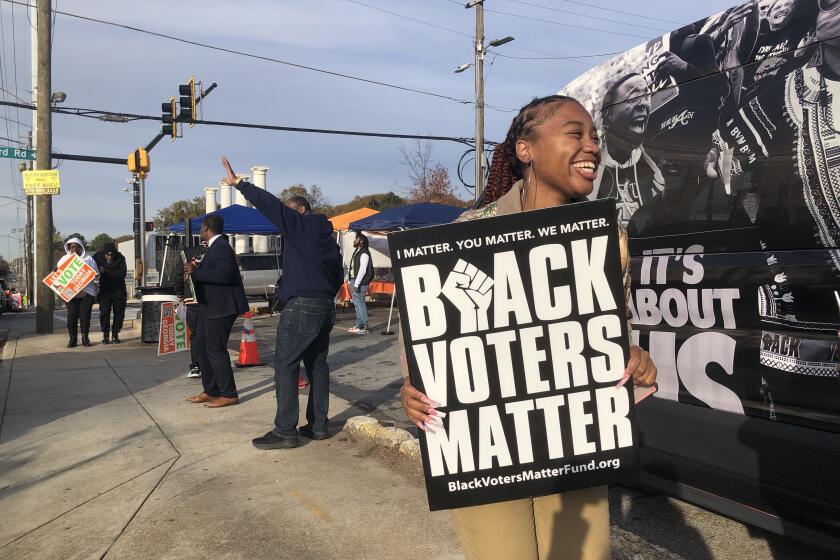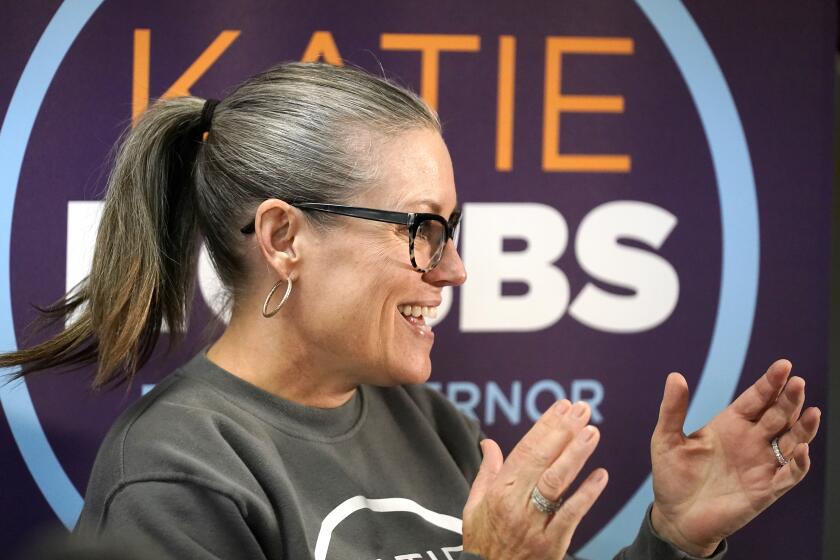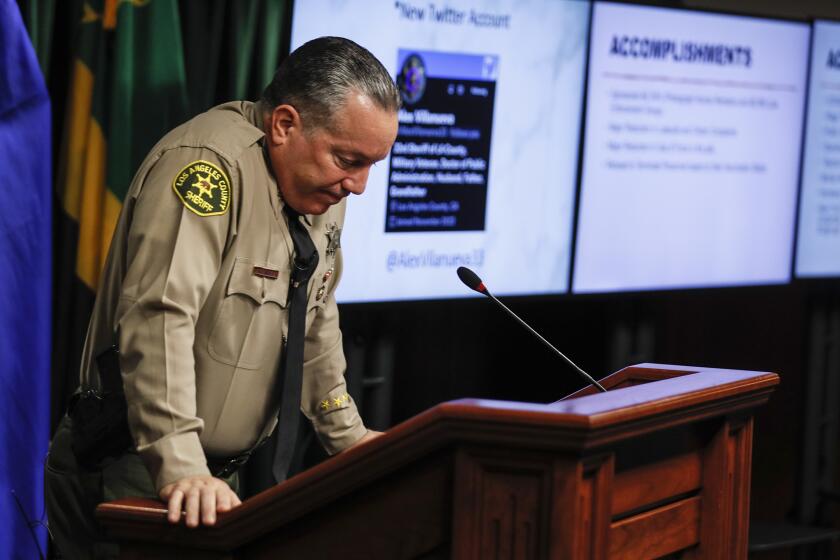Warnock defeats Walker in Georgia runoff, giving Democrats a 51-seat Senate majority
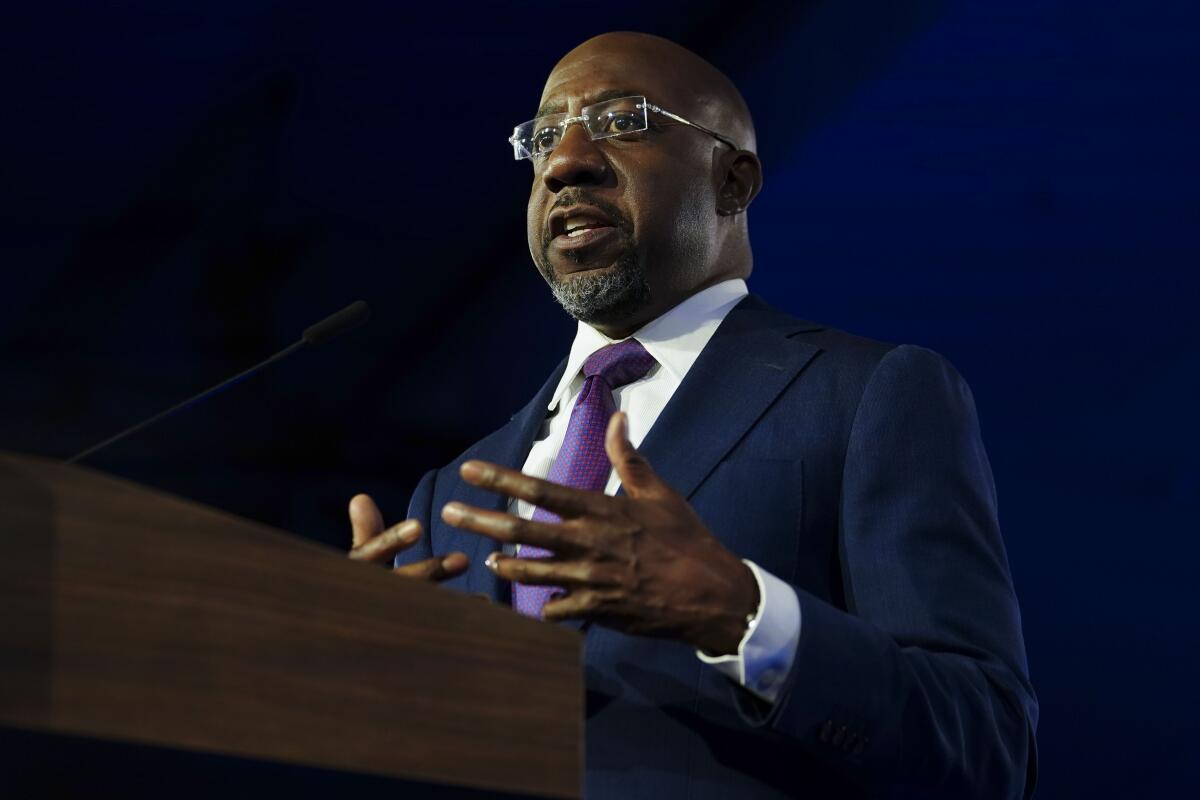
- Share via
ATLANTA — Democratic incumbent Raphael Warnock defeated Republican Herschel Walker on Tuesday in Georgia’s U.S. Senate runoff, securing a 51st seat for his party in Congress’ upper chamber and giving it greater power to push its agenda in a closely divided Washington.
The Associated Press projected Warnock as the winner Tuesday night, though official results will take longer.
Warnock’s victory means Senate Democrats — as long as they vote in unity — will no longer need to rely on Vice President Kamala Harris to cast tiebreaking votes. It also lessens the ability of moderate Democratic Sens. Joe Manchin III of West Virginia and Kyrsten Sinema of Arizona to block or soften legislation, as they’ve done in the current Congress.
With a GOP-led House, prospects for passing new bipartisan legislation are slim. But the one-seat Senate advantage will also give Democrats greater control over the chamber’s committees.
Warnock, a pastor who made history in 2021 when he was elected Georgia’s first Black senator, also offered Democrats in this longtime conservative Southern state a much-needed morale boost after Republicans dominated here in the midterm election and vanquished one of their star players, gubernatorial candidate Stacey Abrams.
“Six more years!” a crowd of Democrats chanted as Warnock walked up to the stage in a packed Atlanta hotel to address his supporters Tuesday night. “Six more years!”
“Thank you, Georgia,” Warnock said. “I want to say thank you from the bottom of my heart, and to God be the glory for the great things that God has done. ... It is my honor to utter the four most powerful words ever spoken in a democracy: The people have spoken.”
Walker was quick to concede.
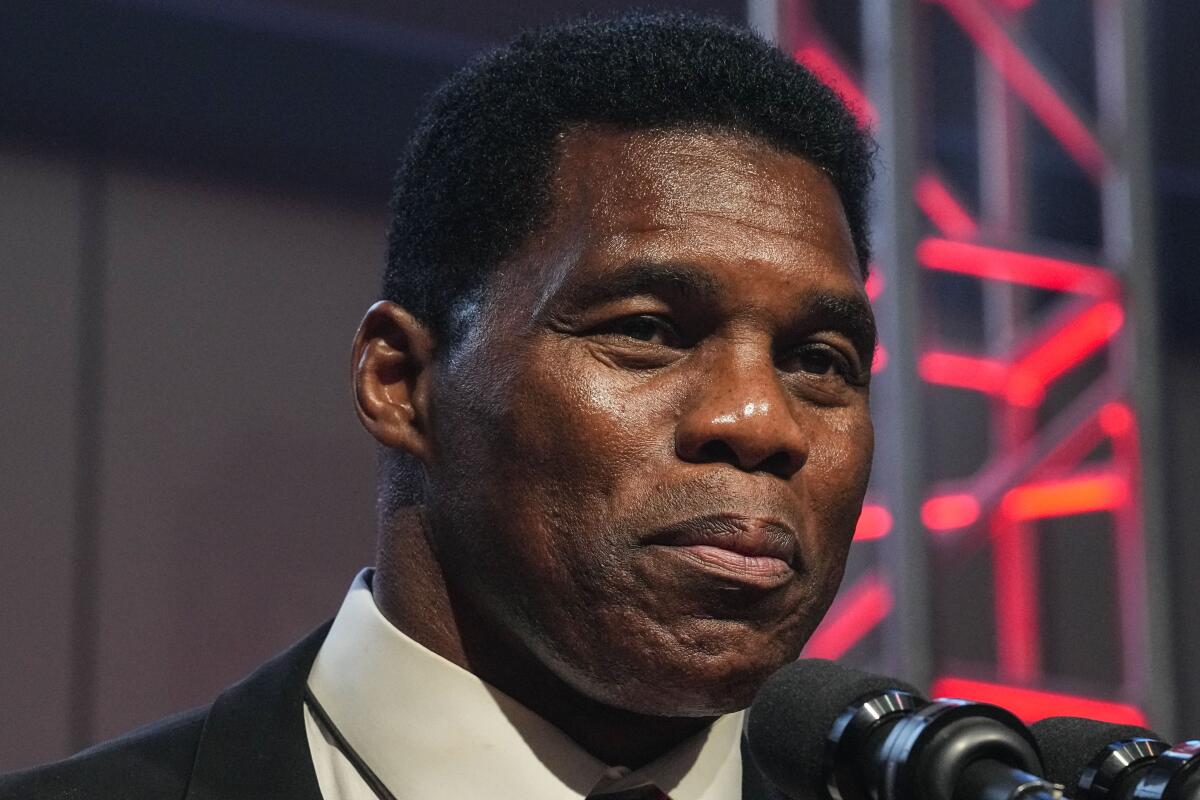
“I’m not going to make any excuses now, because we put up one heck of a fight,” he told supporters gathered at the College Football Hall of Fame in downtown Atlanta.
“The best thing I’ve ever done in my whole entire life is run for the Senate seat. And the reason I’m gonna say that is I got a chance to meet all you and hear what you guys feel about this country.”
President Biden reached out to Warnock by telephone Tuesday night to congratulate him.
“Tonight Georgia voters stood up for our democracy, rejected Ultra MAGAism, and most importantly: sent a good man back to the Senate,” he said on Twitter. “Here’s to six more years.”
It was the first time in a century that all incumbent senators won reelection.
Just before midnight, the secretary of state’s office reported that about 1.6 million Georgians had voted — more than on election day in 2020 and the 2021 runoffs— which brought turnout to 3.5 million when combined with the nearly 1.9 million early voters. (Some 3.9 million voters cast ballots in November in the Senate race.) After waits of more than an hour in many counties in early voting, election day ran smoothly, with voters in most counties facing relatively short wait times.
Warnock secured robust turnout in the Democratic strongholds of metro Atlanta, while Walker underperformed in a swath of rural, predominantly Republican counties.
Warnock’s win confirms Georgia’s position as a key battleground state ahead of the 2024 presidential race and bolsters the argument that Abrams and other Democratic leaders here have pushed for years: that the historic blue wave that saw the state’s voters elect Biden in 2020 and Warnock and Jon Ossoff to the Senate in 2021 was not a fluke, but the beginning of a deeper and more sustained movement to flip Georgia blue.
Georgia’s Senate race between Democratic Sen. Raphael Warnock and Republican Herschel Walker is a question of turnout, voter access and scandals’ reach.
Going into the midterms, Warnock faced a significant challenge in keeping the seat he had won by 90,000 votes in his 2021 runoff against GOP Sen. Kelly Loeffler. Polls showed Georgia voters were disillusioned with Biden and the Democratic Party and frustrated about the economy and inflation.
But Walker, a former University of Georgia football star whom former President Trump encouraged to run, was a wild-card candidate who struggled to broaden his support beyond the GOP primary base. His political inexperience — along with his propensity for gaffes and false claims and his failure to home in on a key message on the campaign trail — led many to question his readiness for office.
Throughout the campaign, the Heisman Trophy-winning former running back and multimillionaire businessman was dogged by scandals, including multiple allegations that he had encouraged and paid for former sexual partners to terminate their pregnancies, despite his support for a national ban on abortion.
Walker also fabricated key details of his education and career, falsely claiming he worked for law enforcement and bragging that he was “in the top 1%” of his college graduating class when he did not graduate.
“It’s been too many unforced errors, too many penalty flags on Herschel Walker,” said Jason Shepherd, assistant professor of political science at Kennesaw State University and former chair of the GOP in Cobb County, Georgia.
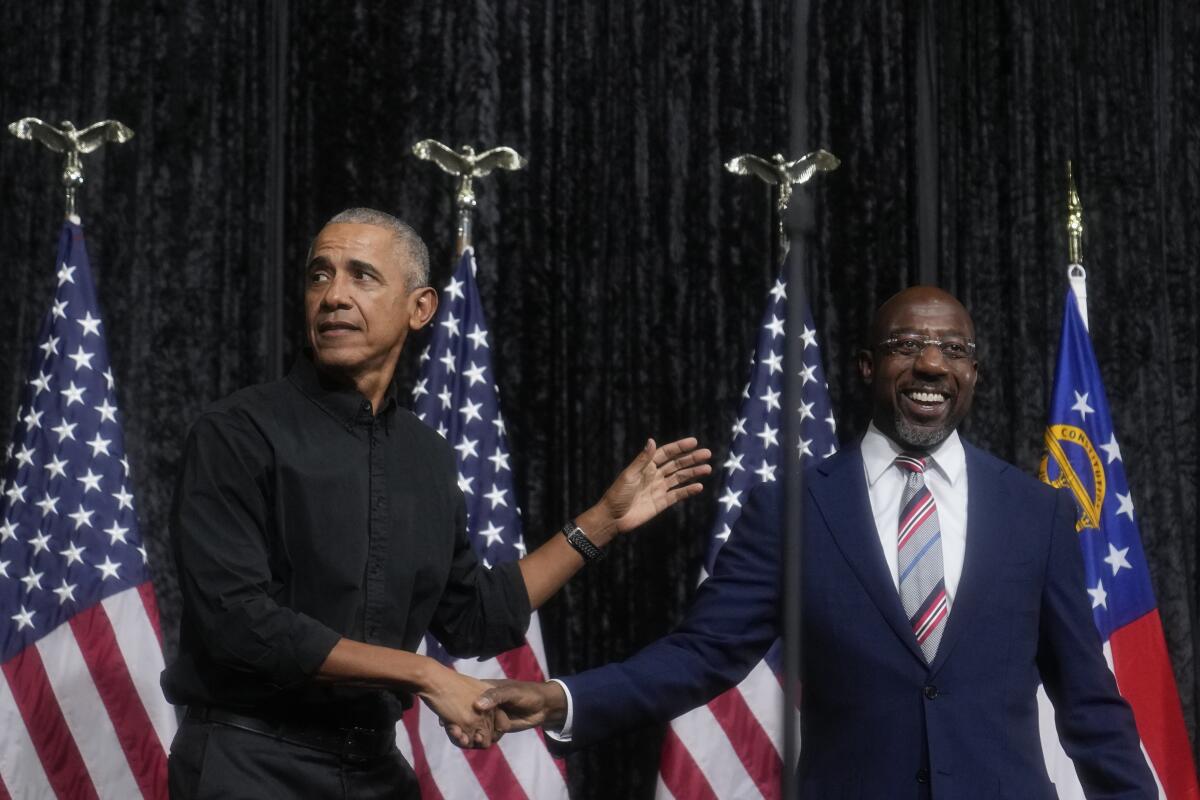
In contrast, Warnock, senior pastor of the Rev. Martin Luther King Jr.’s Ebenezer Baptist Church, stuck to a clear message: that Walker was unfit for office. He also positioned himself as more of a practical senator rather than a progressive change-maker — a stable centrist willing to work across the aisle to make Georgia a better place.
In his short time in office, Warnock noted, he had written the provision in the Inflation Reduction Act that capped insulin prices for Medicare patients. He also emphasized his support for the Infrastructure Investment and Jobs Act, which boosted federal funding for Georgia’s roads and bridges, and for the expanded child tax credit, which he hailed as the single largest tax cut for middle- and working-class families in America.
Gearing his message to moderate voters, Warnock did not hesitate to name-drop Republicans he has worked with, such as Sens. Ted Cruz of Texas and Marco Rubio of Florida.
“I’m the 18th-most bipartisan senator,” he liked to say on the campaign trail.
After giving a shout out to his mother, who grew up in southeastern Georgia picking somebody else’s cotton, and his late father, who picked up junk cars to support his family, Warnock described himself as “an example and an iteration” of Georgia, “its pain and its promise, of the brutality and the possibility.”
“This is America, because we always have a path to make our country greater,” he said. “Against unspeakable odds, here we stand together.”
Taking a jab at Republicans, Warnock dismissed those who said there was no voter suppression in Georgia. Republican state officials tried to block early voting on the Saturday after Thanksgiving, he noted, but Democrats took them to court and won.
“Let me be clear: Just because people endured long lines that wrapped around buildings, some blocks long, just because they endured the rain and the cold and all kinds of tricks in order to vote, doesn’t meant that voter suppression does not exist. It simply means that you, the people, have decided that your voices will not be silenced.”
Walker significantly underperformed in November, trailing every other Georgia Republican running for statewide office and becoming the only one not to win. After struggling to gain the support of moderate conservatives and independents, he received 38,000 fewer votes than Warnock and 200,000 fewer than Republican Gov. Brian Kemp.
Heading into the runoff, Walker’s campaign leaned on Kemp, who had distanced himself from Walker during the general election. The governor lent his get-out-the-vote machine to Senate Minority Leader Mitch McConnell’s super PAC, the Senate Leadership Fund, and appeared at a Walker rally the weekend before Thanksgiving.
Kemp also appeared in a recent ad, assuring conservatives that a vote for Walker would be “a vote for Georgia,” not “another rubber stamp for Joe Biden.”
But Walker struggled to stick with the message pushed by many Republican strategists: linking Warnock with Biden and playing up the issues of inflation, immigration and crime.
Instead, Walker’s rambling campaign speeches were fixated on culture war issues, such as transgender athletes, nonbinary gender identity, and pronoun usage.
“What the heck is a pronoun?” he asked a crowd at a rally in Cumming, Ga. “You know, I’m sick and tired of this pronoun stuff.”
During the runoff campaign, Walker made so many head-scratching remarks — telling a crowd in McDonough, for example, “I don’t want to be a vampire anymore. I wanna be a werewolf” — that Warnock’s campaign aired a TV ad in the final weeks of the race showing Georgia voters responding to Walker’s statements.
A few days ago, “Saturday Night Live” skewered Walker for his inability to stay on message in a skit that ended with an actor playing McConnell reverting to “Plan B” and locking the gaffe-prone candidate in a secure room for the final days of the election.
Throughout the campaign, Warnock and Walker worked to drive turnout among their bases and also appeal to more moderate voters in the suburbs who leaned Republican but were turned off by Trump and voted for the Democrats in the last election cycle.
Before polls opened on election day, Democrats appeared to have a slight edge as state election data showed that more Georgians voted early in predominantly Democratic urban and suburban blue counties than in more conservative rural and exurban counties. Black voters, who tend to vote Democratic, represented 32% of the overall early-voting tally, making up a higher share of early voters than they did in the general election.
But that didn’t mean the battle was over: Republicans — who are typically older and white — tend to show up in greater force on election day.
On election eve, Walker sought to ramp up the GOP base, taking his “Evict Warnock bus tour” across a string of predominantly Republican towns in northern Georgia where he lagged behind Kemp in November.
Get our L.A. Times Politics newsletter
The latest news, analysis and insights from our politics team.
You may occasionally receive promotional content from the Los Angeles Times.
Warnock, in turn, focused on motivating Democrats in Atlanta, meeting with union organizers, students at Georgia Tech and rapper Killer Mike.
The night before voters went to the polls, Warnock took to Twitter to reiterate his key message that Walker was not fit to represent Georgia in the Senate.
“I’ve said it before and I’ll say it again: I can’t have Herschel Walker representing my mama,” Warnock tweeted Monday night.
Democrats spent $56 million on TV and radio ads for the runoff, more than double the $26 million spent by Republicans, according to AdImpact, a media tracking firm.
Ultimately, Georgia Republicans did not put their get-out-the-vote apparatus in place early enough to counter Democrats’ massive fundraising advantage for the Senate race, Shepherd said.
“It was too little, too late,” he said.
Shepherd urged his party to ditch its complacency and hone its message and grassroots get-out-the-vote operation ahead of the 2024 and 2026 midterms.
“A lot of the same mistakes that were made in the 2021 runoff were made here,” he said. “If we don’t look at it critically, then that can spell a recipe for disaster for the Republican Party down the road.”
Democratic state Rep.-elect Lydia Glaize, who represents a predominantly Black suburban area southwest of Atlanta, said her party’s historic wins in 2020 and 2021 motivated the base across metro Atlanta to ramp up the get-out-the-vote drive early.
“People felt strongly about Georgia being progressive,” she said. “I think there was something that happened to us: Those who were thinking we could do this, they became resolved to have a more progressive Georgia, a more inclusive and diverse Georgia.”
For Republicans, Walker’s defeat intensifies debate about Trump’s debilitating effect on the GOP after a string of Trump loyalists — including Dr. Mehmet Oz in Pennsylvania and Blake Masters in Arizona — lost competitive Senate races and dashed Republicans’ hopes of securing a Senate majority.
Trump had also worked to unseat Gov. Kemp after the fellow Republican refused his entreaties to overturn Biden’s 2020 win in Georgia. But Kemp fended off a Trump-backed GOP primary challenger and defeated Abrams by 7.5 percentage points.
“This is Kemp’s party in Georgia, not Trump’s party in Georgia,” said Buzz Brockway, a former GOP state representative. “The message has been sent to Donald Trump by Republicans that we don’t need you. We don’t want you. We’re going to move forward without you.”
More to Read
Get the L.A. Times Politics newsletter
Deeply reported insights into legislation, politics and policy from Sacramento, Washington and beyond. In your inbox three times per week.
You may occasionally receive promotional content from the Los Angeles Times.
